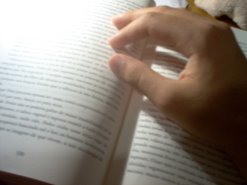In a world where education is predominantly verbal, highly educated people find it all but impossible to pay serious attention to anything but words and notions. There is always money for, there are always doctorates in, the learned foolery of research into what, for scholars, is the all-important problem: Who influenced whom to say what when? Even in this age of technology the verbal humanities are honored. The non-verbal humanities, the arts of being directly aware of the given facts of our existence, ale almost completely ignored. A catalogue, a bibliography, a definitive edition of a third-rate versier's ipsissima verba, a stupendous index to end all indexes - any genuinely Alexandrian project is sure of approval and financial support: But when it comes to finding out how you and I, our children and grandchildren, may become more perceptive, more intensely aware of inward and outward reality, more open to the Spirit, less apt, by psychological malpractices, to make ourselves physically ill, and more capable of controlling our own autonomic nervous system - when it comes to any form of non-verbal education more fundamental (and more likely to be of some practical use) than Swedish drill, no really respectable person in any really respectable university or church will do anything about it. Verbalists are suspicious of the non-verbal; rationalists fear the given, non-rational fact; intellectuals feel that "what we perceive by the eye (or in any other way) is foreign to us as such and need not impress us deeply." Besides, this matter of education in the non-verbal humanities will not fit into any of the established pigeonholes. It is not religion, not neurology, not gymnastics, not morality or civics, not even experimental psychology. This being so the subject is, for academic and ecclesiastical purposes, non-existent and may safely be ignored altogether or left, with a Patronizing smile, to those whom the Pharisees of verbal orthodoxy call cranks, quacks, charlatans and unqualified amateurs. "I have always found," Blake wrote rather bitterly, "that Angels have the vanity to speak of themselves as the only wise. This they do with a confident insolence sprouting from systematic reasoning." Systematic reasoning is something we could not, as a species or as individuals, possibly do without. But neither, if we are to remain sane, can we possibly do without direct perception, the more unsystematic the better, of the inner and outer worlds into which we have been born
sábado, 13 de abril de 2024
Subscrever:
Enviar feedback (Atom)


Sem comentários:
Enviar um comentário